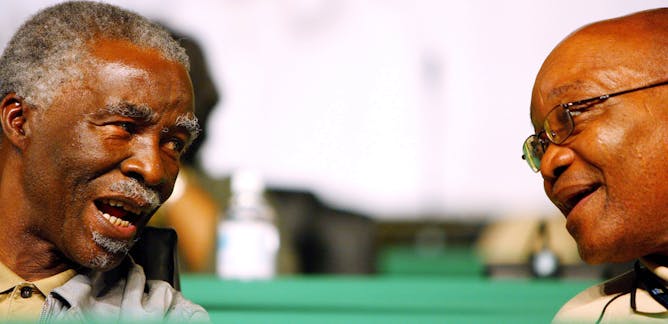
Articles on Zondo Commission
Displaying 1 - 20 of 57 articles

The second episode of What happened to Nelson Mandela’s South Africa?, a three-part podcast series on The Conversation Weekly. Featuring interviews with Mashupye Maserumule and Michael Sachs.

Whistleblowers should be entitled to financial support. But that has potential costs as well as benefits.

If an offender is lawfully released on medical parole, but their health improves or even if they are cured, they cannot be forced to return to prison.

South Africa needs a new social contract whose core aim is the creation of dynamic economy.

Given South Africa’s staggering corruption levels, a strong legal framework is needed to encourage and protect whistleblowers.

Mashatile could be the new broom that sweeps clean. Ramaphosa’s apparent confidence in him suggests that he has some latitude to do so.

Having an intelligence service that is not fit for purpose means the country is vulnerable to security threats from within and outside the country.

The decline in support for the ANC suggests that coalition governments will become increasingly common in the country, affecting its appointment policy.

South Africans are actively challenging the criminalisation of the state. Many of the revelations about fraud, corruption and nepotism come from principled whistle-blowers within the state.

Parliament’s failure to live up to its constitutional mandate was noted by the State Capture Commission as having enabled former president Zuma’s regime to corrupt state behaviour with ease.

Ramaphosa’s presidency has been dogged by several controversies related to his business interests.

A judicial commission into state corruption found that the Gupta family influenced former President Jacob Zuma’s political decisions.

Rebuilding South Africa after the devastation of state capture would not be possible without the work of the Zondo commission.

Zondo’s career is made up of a tapestry of highlights, from lawyer to senior judge. He has written more than 200 judgments.

A judicial commission has found that the Guptas orchestrated massive corruption and the capture of the South African state, with the help of their friend, former president Jacob Zuma.

The scale of the Guptas’ rapaciousness meant that, within just a few years, the institutions they leeched were in a state of collapse.

The ANC retains its determination to rule yet lacks the capacity to do so effectively. The only way out of the dilemma is its defeat in an election.

Most South Africans believe the report into state capture must be followed up to ensure that those responsible for rampant corruption are held accountable.

Ramaphosa currently has no known rivals with widespread support within the African National Congress.

Attacks on national power generation’s critical infrastructure are a known strategy of hybrid warfare.
